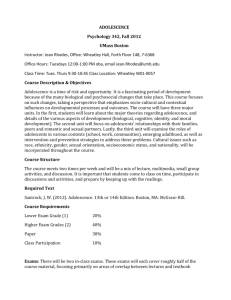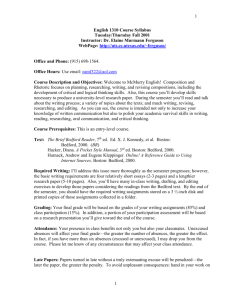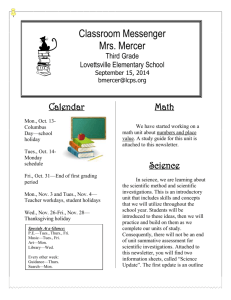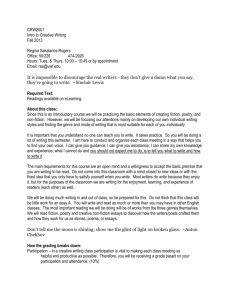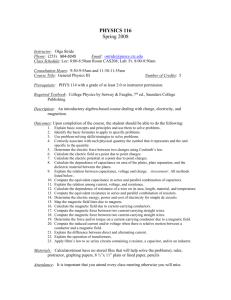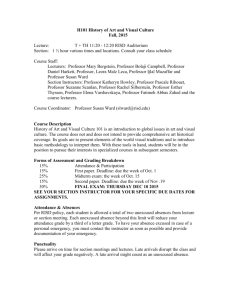Biol490_Fall2013_Syllabus
advertisement
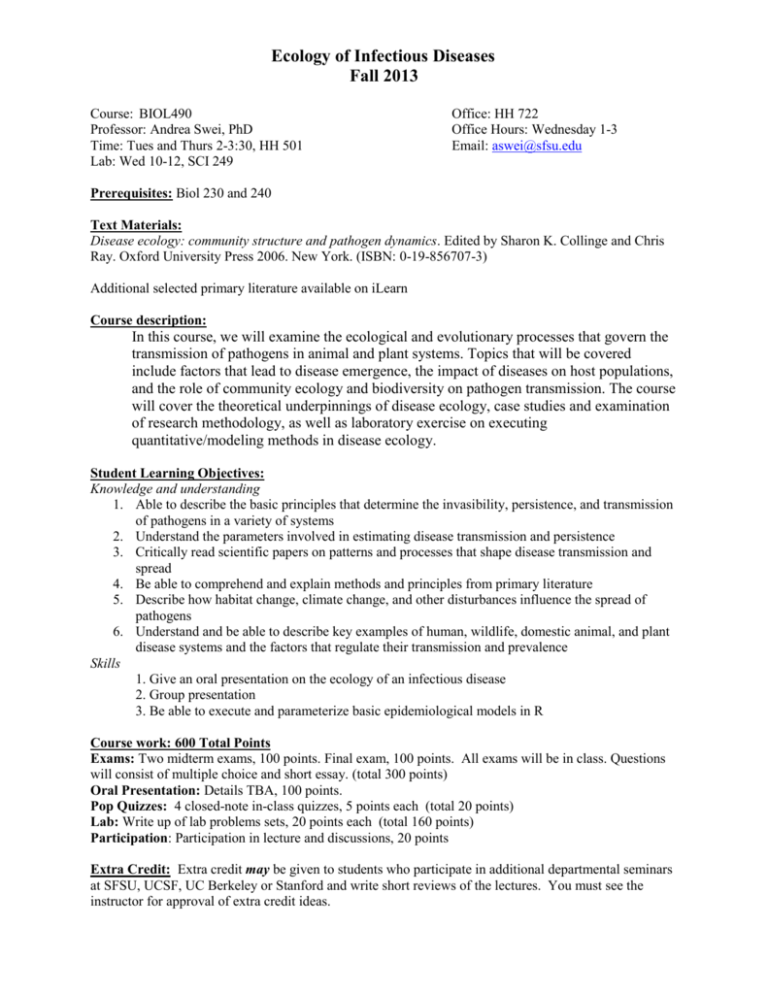
Ecology of Infectious Diseases Fall 2013 Course: BIOL490 Professor: Andrea Swei, PhD Time: Tues and Thurs 2-3:30, HH 501 Lab: Wed 10-12, SCI 249 Office: HH 722 Office Hours: Wednesday 1-3 Email: aswei@sfsu.edu Prerequisites: Biol 230 and 240 Text Materials: Disease ecology: community structure and pathogen dynamics. Edited by Sharon K. Collinge and Chris Ray. Oxford University Press 2006. New York. (ISBN: 0-19-856707-3) Additional selected primary literature available on iLearn Course description: In this course, we will examine the ecological and evolutionary processes that govern the transmission of pathogens in animal and plant systems. Topics that will be covered include factors that lead to disease emergence, the impact of diseases on host populations, and the role of community ecology and biodiversity on pathogen transmission. The course will cover the theoretical underpinnings of disease ecology, case studies and examination of research methodology, as well as laboratory exercise on executing quantitative/modeling methods in disease ecology. Student Learning Objectives: Knowledge and understanding 1. Able to describe the basic principles that determine the invasibility, persistence, and transmission of pathogens in a variety of systems 2. Understand the parameters involved in estimating disease transmission and persistence 3. Critically read scientific papers on patterns and processes that shape disease transmission and spread 4. Be able to comprehend and explain methods and principles from primary literature 5. Describe how habitat change, climate change, and other disturbances influence the spread of pathogens 6. Understand and be able to describe key examples of human, wildlife, domestic animal, and plant disease systems and the factors that regulate their transmission and prevalence Skills 1. Give an oral presentation on the ecology of an infectious disease 2. Group presentation 3. Be able to execute and parameterize basic epidemiological models in R Course work: 600 Total Points Exams: Two midterm exams, 100 points. Final exam, 100 points. All exams will be in class. Questions will consist of multiple choice and short essay. (total 300 points) Oral Presentation: Details TBA, 100 points. Pop Quizzes: 4 closed-note in-class quizzes, 5 points each (total 20 points) Lab: Write up of lab problems sets, 20 points each (total 160 points) Participation: Participation in lecture and discussions, 20 points Extra Credit: Extra credit may be given to students who participate in additional departmental seminars at SFSU, UCSF, UC Berkeley or Stanford and write short reviews of the lectures. You must see the instructor for approval of extra credit ideas. Missed Test: If a student misses a midterm without either a certified medical excuse or prior instructor approval, the student may take a makeup test at a designated time at the end of the semester. Only one makeup test/quiz will be given. It will be fair but challenging! Tests missed with certified medical excuses or prior instructor approval will be dealt with individually. If a student misses the final exam without a valid excuse, a zero will be averaged into the grade. Missed labs cannot be retaken. Grading: Final grades are computed as a letter grade, plus or minus where appropriate: A (93.00-100%), A- (90.0092.99%), B+ (87.00-89.99%), B (83.00-86.99%), B- (80.00-82.99%), C+ (77.00-79.99%), C (73.0076.99%), C- (70.00-72.99%), D+ (67.00-69.99%), D (63.00-66.99%), D- (60.00-62.99%) and F (59.99% or below). Work that is turned in late will lose 10% of total points per day past due. At the end of the semester, if a student is borderline between 2 grades (for example, between an A- and a B+), discretionary criteria will be used to determine which of the two grades, the student receives. These criteria will include class participation, class attendance, and the student’s willingness to seek help. Attendance: Attendance and punctuality are required for the class. All quiz questions are derived from class material. General Classroom Policy: Mobile phones must be switched off. Honor Code: By your signature on the attendance sheet, you are agreeing to abide by a class honor code. This means that you agree not to cheat or participate in any type of academic misconduct (plagiarism etc). In addition, if you become aware that a classmate has cheated or engaged in academic misconduct, it is your responsibility to bring it to the instructor’s attention. In this way, you and your classmates are responsible for each other’s academic behavior. Any student caught Disabilities: Students with disabilities who need reasonable accommodations are encouraged to contact the instructor early in the semester. The Disability Programs and Resource Center is available to facilitate the reasonable accommodations process. The DPRC, located in SSB 110, can be reached by telephone at 338-2472 (voice/TTY) or by e-mail at dprc@sfsu.edu. Add/Drop/Withdrawal: For complete schedule see: http://www.sfsu.edu/~admisrec/reg/regsched134.html Class start: August 27, 2013 Drop deadline: Monday, September 9 Add deadline: Monday, September 9 (last date to add with permit numbers). Withdrawal: September 10-November 22. After that, no withdrawal unless seriously ill, in case of accident, or circumstances beyond the student’s control. Final exam: Thursday December 19th 1:30-4pm in HH501 Lecture Schedule Week 1 Date Aug 27 Topic Tues: Introduction to disease ecology and evolution Reading 2 Aug 29 Sep 3 Sep 5 Thurs: Community ecology and host-pathogen systems Tues: Foundations of disease ecology: SIR models and R0 Thurs: Macroparasite systems 3 Sep 10 Tues: Host population regulation by parasite Collinge Ch 2 Anderson and May 1991 King et al. 2006, Collinge Ch 10 Hudson et al. 1998 Sep 12 Thurs: Parasite induced behavioral modification Moore 1983 Sep 17 Tues: Guest lecture on amphibian declines (Dr. Vance Vredenburg, SFSU) Wake and Vredenburg 2008 Sep 19 Thurs: Wildlife disease and seasonality 5 Sep 24 Sep 26 Tues: Spatial-temporal dynamics and networks: rabies Thurs: Midterm Collinge. Ch 3, Dobson and Meagher 1996 Collinge Ch 12 6 Oct 1 Oct 3 Oct 8 Tues: Evolution of virulence Thurs: Student presentations Tues: Heterogeneity and transmission: superspreaders and AIDS Thurs: Biodiversity and the dilution effect Galvani 2003, Ewald 1993 Oct 15 Tues: Vector-borne diseases: Lyme disease, malaria, West Nile Virus Collinge Ch 3, Druilhe et al. 2005 Oct 17 Thurs: Student presentations 9 Oct 22 Bennett 2010, Ch 9 10 Oct 24 Oct 29 Oct 31 Tues: Guest lecture on Dengue virus (Dr. Shannon Bennett, CAS) Thurs: Seasonality and Conservation Tues: Student presentations Thurs: Midterm 11 Nov 5 Tues: Disease control: herd immunity and culling vaccinations Nov 7 Thurs: Novel pathogens, prions and infectious cancers Lloyd-Smith et al. 2005 TREE, Mackinnon et al. 2008 McCallum and Dobson 2002 Nov 12 Tues: Coevolution and antibiotic resistance: tuberculosis Levy and Marshall 2004 Nov 14 Thurs: Guest lecture on avian malaria (Dr. Ravinder Sehgal, SFSU) Tues: Guest lecture on viral discovery (Dr. Samia Nacacche, UCSF) Thurs: Guest lecture on physiology and disease (Dr. Rudolf von May, UC Berkeley) Thanksgiving break Collinge Ch 13 Guest lecture on white nose bat syndrome (Tina Cheng, UCSC) TBD Guest lecture on African frog declines (Dr. David Blackburn, CAS) Guest lecture on Sudden Oak Death (Dr. Margaret Metz, UC Davis) Collinge Ch 11 4 7 Oct 10 8 12 13 Nov 19 Nov 21 14 15 Nov 2628 Dec 3 Dec 5 16 Dec 10 Dec 12 Final Exam Lloyd-Smith et al. 2005 Nature Keesing et al. 2010 Altizer et al. 2006 TBD TBD TBD TA-led Review Thursday December 19th 1:30-4pm Location: HH 501 Lab Schedule Week Week 1 Week 2 Week 3 Week 4 Week 5 Week 6 Week 7 Week 8 Week 9 Week 10 Week 11 Week 12 Week 13 Week 14 Week 15 Week 16 Schedule No lab Lab 1: Introduction to R part I Lab 2: Data analysis and plotting Discussion Midterm review Lab 3: Difference equation model Lab 4: Chain binomial lab Lab 5: SI lab Discussion Midterm review Lab 6: SIR Lab Lab 7: R0 lab Lab 8: GLMM analysis Discussion Open Lab No lab Instructor GA led GA led GA led GA led GA led GA led


